FIND ALL ZEROS OF THE POLYNOMIAL
Subscribe to our ▶️ YouTube channel 🔴 for the latest videos, updates, and tips.
Subscribe to our ▶️ YouTube channel 🔴 for the latest videos, updates, and tips.
To find zeroes of the polynomial, we have different methods as follows.
i) Factoring
ii) Using synthetic division
iii) Using rational root theorem
Problem 1 :
Find all of the rational zeros of
f(x) = 5x3 + 12x2 - 29x + 12
Solution :
f(x) = 5x3 + 12x2 - 29x + 12
an = 5 and a0 = 12
Factor of a0, values of p = ±1, ±2, ±3, ±4, ±6, ±12
Factor of an values of q = ±1, ±5
p/q =±1, ±2, ±3, ±4, ±6, ±12, ±2/5, ±3/5, ±4/5, ±6/5, ±12/5
Using synthetic division,
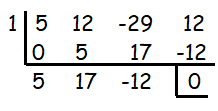
1 is the solution. To find the other two solutions, let us solve this quadratic equation got as quotient.
5x2 + 17x - 12 = 0
5x2 + 20x - 3x - 12 = 0
5x(x + 4) - 3(x + 4) = 0
(5x - 3) (x + 4) = 0
x = 3/5 and x = -4
So, the solutions are -4, 1 and 3/5.
Problem 2 :
f(x) = 8x4 + 2x3 + 5x2 + 2x - 3
Solution :
Using rational root theorem, we find the possible roots for the given polynomial.
an = 8 and a0 = -3
Factor of a0, values of p = ±1, ±3
Factor of an values of q = ±1, ±2, ±4, ±8
p/q =±1, ±1/2, ±1/4, ±1/8, ±3/2, ±3/4, ±3/8
Using remainder theorem,
f(1) = 8(1)4 + 2(1)3 + 5(1)2 + 2(1) - 3
= 8 + 2 + 5 + 2 - 3
≠ 0
f(-1) = 8(-1)4 + 2(-1)3 + 5(-1)2 + 2(-1) - 3
= 8 - 2 + 5 - 2 - 3
≠ 0
f(1/2) = 8(1/2)4 + 2(1/2)3 + 5(1/2)2 + 2(1/2) - 3
= 8(1/16) + 2(1/8) + 5(1/4) + 1 - 3
= 1/2 + 1/4 + 5/4 - 2
= (2 + 1 + 5 - 8)/4
= 0
So 1/2 is one of the solutions
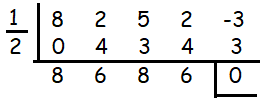
The quotient = 8x3 + 6x2 + 8x + 6
Solving this quotient, we will get the remaining zeroes.
2x2(4x + 3) + 2(4x + 3) = 0
(2x2 + 2)(4x + 3) = 0
2(x2 + 1)(4x + 3) = 0
x = -3/4 and x = ±i
So, the solutions are 1/2, -3/4 and ±i
Problem 3 :
x3 + 4x2 - 25x - 28
Solution :
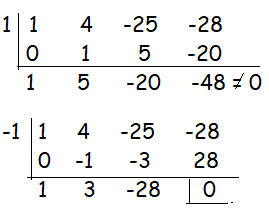
From the above synthetic division, it is clear that -1 is one of the solution.
The quotient = x2 + 3x - 28 = 0
(x + 7)(x - 4) = 0
x = -7 and x = 4
So, the solution are -1, 4 and -7.
Problem 4 :
x4 + 2x3 - 11x2 + 8x - 60
Solution :
Using rational root theorem, we find the possible roots for the given polynomial.
an = 1 and a0 = -60
Factor of a0, values of p = ±1, ±2, ±3, ±4, ±5, ±10, ±12, ±15, ±20, ±30, ±60
Factor of an values of q = ±1
p/q = ±1, ±2, ±3, ±4, ±5, ±10, ±12, ±15, ±20, ±30, ±60
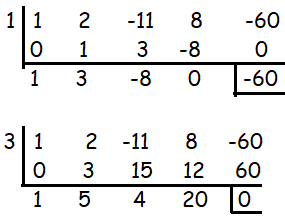
So, 3 is one of the solutions.
The quotient = x3 + 5x2 + 4x + 20 = 0
x2 (x + 5) + 4 (x + 5) = 0
(x2 + 4) (x + 5) = 0
x2 + 4 = 0 and x + 5 = 0
x = ±2i and x = -5
Problem 5 :
x3 + 6x2 + 4x + 24
Solution :
Using rational root theorem, we find the possible roots for the given polynomial.
an = 1 and a0 = 24
Factor of a0, values of p = ±1, ±2, ±3, ±4, ±6, ±8, ±12, ±24
Factor of an values of q = ±1
p/q = ±1, ±2, ±3, ±4, ±6, ±8, ±12, ±24
x3 + 6x2 + 4x + 24 = 0
x2(x + 6) + 4(x + 6) = 0
(x2+ 4) (x + 6) = 0
x2+ 4 = 0 and x = -6
x2 = - 4
x = ±i
So, the solution -6, i and -i.
Problem 6 :
4x4 + 5x3 + 30x2 + 45 x - 54
Solution :
Using rational root theorem, we find the possible roots for the given polynomial.
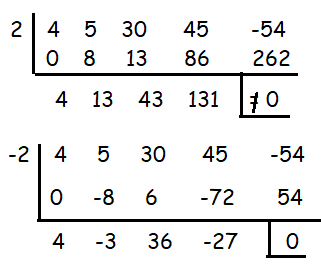
So, one of the solutions is -2.
4x3 - 3x2 + 36x - 27 = 0
x2(4x - 3) + 9(4x - 3) = 0
(x2+ 9)(4x - 3) = 0
x2+ 9 = 0 and 4x - 3 = 0
x2 = - 9 and x = 3/4
x = ±3i
So, the solutions are -2, 3/4, 3i and -3i
Recent Articles
-
Finding Range of Values Inequality Problems
May 21, 24 08:51 PM
Finding Range of Values Inequality Problems -
Solving Two Step Inequality Word Problems
May 21, 24 08:51 AM
Solving Two Step Inequality Word Problems -
Exponential Function Context and Data Modeling
May 20, 24 10:45 PM
Exponential Function Context and Data Modeling